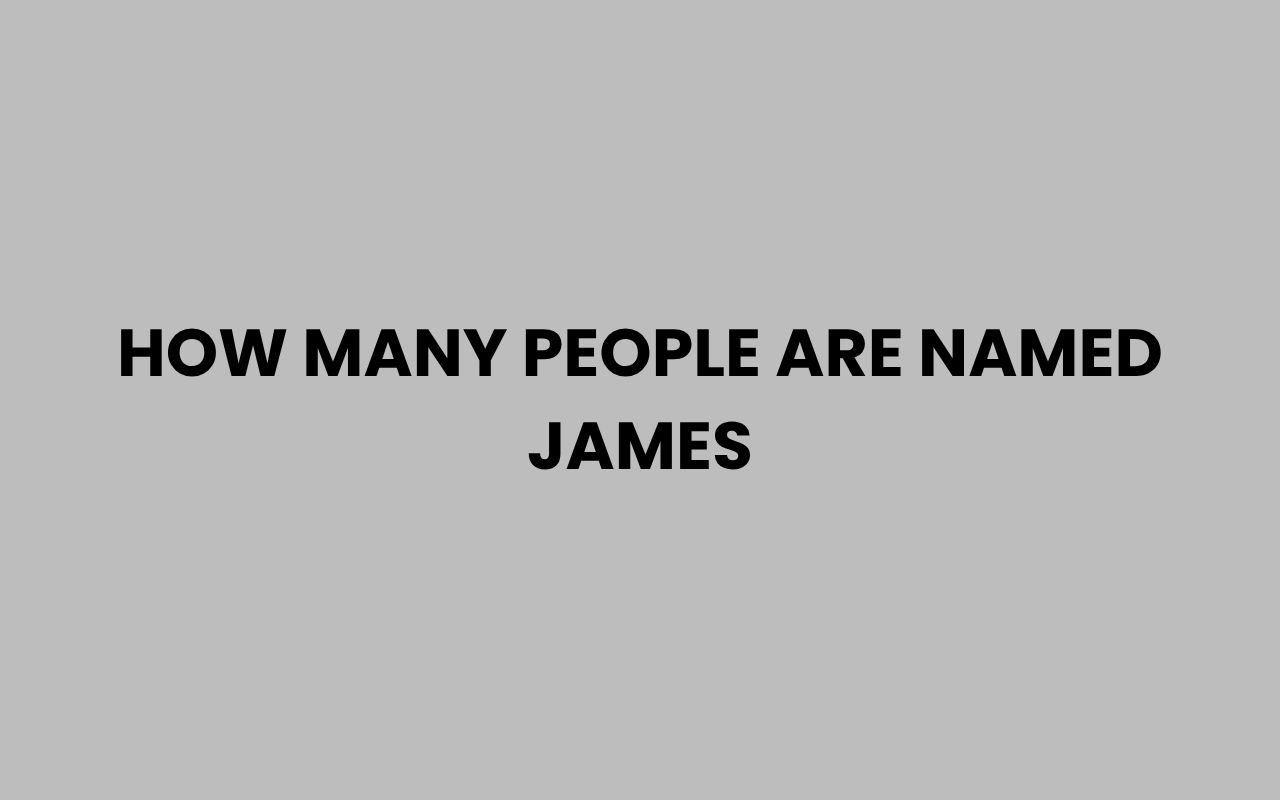James is one of the most enduring and popular male names across the English-speaking world. Its origins trace back to the Hebrew name Yaakov, which evolved into the Latin Iacomus, eventually becoming James in English.
The name carries historical, cultural, and religious significance, contributing to its widespread use.
Understanding how many people are named James involves looking at various demographic data, cultural trends, and historical usage. This article explores the prevalence of the name James across different countries, its popularity over time, and notable individuals who have carried this name.
Historical Popularity of the Name James
The name James has been popular for centuries, especially in English-speaking countries. It was borne by several kings of Scotland and England, which helped cement its status as a royal and classic name.
In the United States, James has consistently been a top name for boys for over 100 years. According to the Social Security Administration (SSA), James was the most popular boy’s name from 1940 to 1952 and has remained in the top 20 for most of the 20th and 21st centuries.
“The name James has a timeless appeal, balancing tradition and modernity in a way few names can.”
Current Statistics: How Many People Are Named James?
Estimating the exact number of people named James worldwide is challenging due to variations in record-keeping and name spellings. However, using data from national statistics offices, social security databases, and census records, we can approximate the numbers in several countries.
| Country | Estimated Number Named James | Source |
|---|---|---|
| United States | 4,200,000+ | Social Security Administration, Census Data |
| United Kingdom | 1,200,000+ | Office for National Statistics |
| Canada | 450,000+ | Statistics Canada |
| Australia | 300,000+ | Australian Bureau of Statistics |
| New Zealand | 75,000+ | New Zealand Department of Internal Affairs |
These numbers reflect people of all ages who have James as their first name. The figures for other countries may be lower or higher depending on cultural differences and the popularity of the name locally.
Popularity Trends Over Time
Popularity trends for James show interesting shifts. For example, in the United States, James was the number one name in the mid-20th century but has declined somewhat in ranking in recent years.
The graph below illustrates the ranking of the name James among newborn boys in the U.S. from 1900 to 2023:
| Year | Rank |
|---|---|
| 1900 | 3 |
| 1950 | 1 |
| 1980 | 2 |
| 2000 | 4 |
| 2010 | 8 |
| 2020 | 11 |
| 2023 | 12 |
Despite slipping from its peak, James remains a beloved and frequently chosen name for boys. Its classic nature ensures it will likely continue to be popular for decades.
The Name James Around the World
While the English form “James” is common in English-speaking countries, its variants exist worldwide. These variants contribute to the broader family of names related to James:
- Diego (Spanish)
- Jacques (French)
- Giacomo (Italian)
- Jaime (Spanish and Portuguese)
- Yakub (Arabic, derived from the same Semitic root)
Each variant has its own popularity and cultural significance, but the English form James remains one of the most internationally recognized.
Notable People Named James
The name James has been held by many influential figures throughout history. Their accomplishments span royalty, literature, science, entertainment, and politics.
| Name | Field | Notable Achievements |
|---|---|---|
| James Madison | Politics | 4th President of the United States, “Father of the Constitution” |
| James Joyce | Literature | Author of “Ulysses” and “Dubliners” |
| James Cameron | Film | Director of “Titanic” and “Avatar” |
| James Baldwin | Writing and Civil Rights | Novelist, essayist, and social critic |
| LeBron James | Sports | NBA superstar and philanthropist |
These individuals demonstrate the versatility and global recognition of the name James across various domains.
Why Is James So Popular?
The popularity of James can be attributed to several factors:
- Historical significance: The name was borne by kings and religious figures, giving it prestige.
- Religious roots: James is associated with important biblical characters like James the Apostle.
- Timeless appeal: It is classic and easy to pronounce in many languages.
- Flexibility: Nicknames like Jim, Jimmy, and Jamie allow for personal customization.
These factors combine to make James a name that feels both familiar and respectable, appealing to parents across generations.
Variations and Nicknames
James offers many diminutives and variations that are often used affectionately. Some of the most common include:
- Jim
- Jimmy
- Jamie
- Jem (less common, historical)
- Jay (modern nickname)
These nicknames often become standalone names themselves, adding complexity to counting how many people are named James versus its variants.
Gender Usage
While James is overwhelmingly used as a male given name, there are instances where it has been used for females, though these are rare. More commonly, feminine counterparts or related names like Jamie or Jamesina have been used for girls.
The name’s strong masculine identity has remained intact in most cultures.
Conclusion
James is a name with deep historical roots, broad cultural significance, and lasting popularity. With millions of people worldwide bearing the name, it continues to be a favorite choice for parents.
The name’s adaptability, rich heritage, and association with notable figures ensure that James will remain a staple in name registries for many years to come.
If you meet someone named James, you are likely encountering a person with a name that carries centuries of history and a rich tapestry of cultural meaning.

